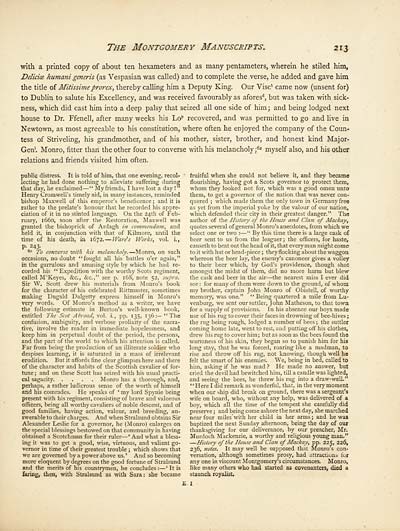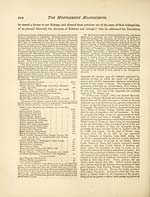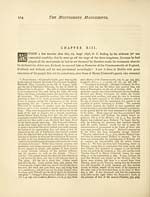Montgomery manuscripts
(227) Page 213
Download files
Complete book:
Individual page:
Thumbnail gallery: Grid view | List view

The Montgomery Manuscripts.
213
with a printed copy of about ten hexameters and as many pentameters, wherein he stiled him,
Delicice humani generis (as Vespasian was called) and to complete the verse, he added and gave him
the title of Mitissime prorex, thereby calling him a Deputy King. Our Vise' came now (unsent for)
to Dublin to salute his Excellency, and was received favourably as afores d , but was taken with sick-
ness, which did cast him into a deep palsy that seized all one side of him; and being lodged next
house to Dr. Ffenell, after many weeks his Lo p recovered, and was permitted to go and live in
Newtown, as most agreeable to his constitution, where often he enjoyed the company of the Coun-
tess of Striveling, his grandmother, and of his mother, sister, brother, and honest kind Major-
Gen 1 . Monro, fitter than the other four to converse with his melancholy; 62 myself also, and his other
relations and friends visited him often.
public distress. It is told of him, that one evening, recol-
lecting he had done nothing to alleviate suffering during
that day, he exclaimed — " My friends, I have lost a day !"
Henry Cromwell's timely aid, in many instances, reminded
bishop Maxwell of this emperor's beneficence ; and it is
rather to the prelate's honour that he recorded his appre-
ciation of it in no stinted language. On the 24th of Feb-
ruary, 1660, soon after the Restoration, Maxwell was
granted the bishoprick of Ardagh in commendam, and
held it, in conjunction with that of Kilmore, until the
time of his death, in 1672. — Ware's Works, vol. i.,
p. 243.
62 To converse with his melancholy. — Monro, on such
occasions, no doubt "fought all his battles o'er again,"
in the garrulous and amusing style by which he had re-
corded his "Expedition with the worthy Scots regiment,
called M^Keyes, &c, &c," see p. 168, note 52, supra.
Sir W. Scott drew his materials from Monro's book
for the character of his celebrated Rittmaster, sometimes
making Dugald Dalgetty express himself in Monro's
very words. Of Monro's method as a writer, we have
the following estimate in Burton's well-known book,
entitled The Scot Abroad, vol. i., pp. 135, 136:— "The
confusion, ambiguity, and verbose prolixity of the narra-
tive, involve the reader in immediate hopelessness, and
keep him in perpetual doubt of the period, the persons,
and the part of the world to which his attention is called.
Far from being the production of an illiterate soldier who
despises learning, it is saturated in a mass of irrelevant
erudition. But it affords fine clear glimpses here and there
of the character and habits of the Scottish cavalier of for-
tune ; and on these Scott has seized with his usual practi-
cal sagacity Monro has a thorough, and,
perhaps, a rather ludicrous sense of the worth of himselt
and his comrades. He speaks of ' my lord Spynie being
present with his regiment, consisting of brave and valorous
officers, being all worthy cavaliers of noble descent, and of
good families, having action, valour, and breeding, an-
swerable to their charges. And when Stralsund obtains Sir
Alexander Leslie for a governor, he (Monro) enlarges on
the special blessings bestowed on that community in having
obtained a Scotchman for their ruler — ' And what a bless-
ing it was to get a good, wise, virtuous, and valiant go-
vernor in time of their greatest trouble ; which shows that
we are governed by a power above us.' And so becoming
more eloquent by degrees on the good fortune of Stralsund
and the merits of his countrymen, he concludes:—' It is
faring, then, with Stralsund as with Sara: she became
fruitful when she could not believe it, and they became
flourishing, having got a Scots governor to protect them,
whom they looked not for, which was a good omen unto
them, to get a governor of the nation that was never con-
quered ; which made them the only town in Germany free
as yet from the imperial yoke by the valour of our nation,
which defended their city in their greatest danger." The
author of the History of the House and Clan of Mackay,
quotes several of general Monro's anecdotes, from which we
select one or two : — " By this time there is a large cask of
beer sent to us from the leaguer ; the officers, for haste,
causeth to beat out the head of it, that every man might come
to it with hat or head-piece ; they flocking about the waggon
whereon the beer lay, the enemy's canoneer gives a volley
to their beer which, by God's providence, though shot
amongst the midst of them, did no more harm but blew
the cask and beer in the air — the nearest miss I ever did
see : for many of them were down to the ground, of whom
my brother, captain John Monro of Obistell, of worthy
memory, was one." " Being quartered a mile from Lu-
venburg, we sent oursuttler, John Matheson, to that town
for a supply of provisions. In his absence our boys made
use of his rug to cover their faces in drowning of bee-hives ;
the rug being rough, lodged a number of bees ; the suttler
coming home late, went to rest, and putting off his clothes,
drew his rug to cover him; but as soon as the bees found the
warmness of his skin, they began so to punish him for his
long stay, that he was forced, roaring like a madman, to
rise and throw off his rug, not knowing, though well he
felt the smart of his enemies. We, being in bed, called to
him, asking if he was mad ? He made no answer, but
cried the devil had bewitched him, till a candle was lighted,
and seeing the bees, he threw his rug into a draw-well."
' ' Here I did remark as wonderful, that, in the very moment
when our ship did break on ground, there was a sergeant's
wife on board, who, without any help, was delivered of a
boy, which all the time of the tempest she carefully did
preserve ; and being come ashore the next day, she marched
near four miles'with her child in her arms ; and he was
baptized the next Sunday afternoon, being the day of our
thanksgiving for our deliverance, by our preacher, Mr.
Murdoch Mackenzie, a worthy and religious young man."
— History of the House and Clan of Mackay, pp. 225, 226,
236, notes. It may well be supposed that Monro's con-
versation, although sometimes prosy, had attraction^ for
any one in viscount Montgomery's circumstances. Monro,
like many others who had started as covenanters, died a
staunch royalist.
E 1
213
with a printed copy of about ten hexameters and as many pentameters, wherein he stiled him,
Delicice humani generis (as Vespasian was called) and to complete the verse, he added and gave him
the title of Mitissime prorex, thereby calling him a Deputy King. Our Vise' came now (unsent for)
to Dublin to salute his Excellency, and was received favourably as afores d , but was taken with sick-
ness, which did cast him into a deep palsy that seized all one side of him; and being lodged next
house to Dr. Ffenell, after many weeks his Lo p recovered, and was permitted to go and live in
Newtown, as most agreeable to his constitution, where often he enjoyed the company of the Coun-
tess of Striveling, his grandmother, and of his mother, sister, brother, and honest kind Major-
Gen 1 . Monro, fitter than the other four to converse with his melancholy; 62 myself also, and his other
relations and friends visited him often.
public distress. It is told of him, that one evening, recol-
lecting he had done nothing to alleviate suffering during
that day, he exclaimed — " My friends, I have lost a day !"
Henry Cromwell's timely aid, in many instances, reminded
bishop Maxwell of this emperor's beneficence ; and it is
rather to the prelate's honour that he recorded his appre-
ciation of it in no stinted language. On the 24th of Feb-
ruary, 1660, soon after the Restoration, Maxwell was
granted the bishoprick of Ardagh in commendam, and
held it, in conjunction with that of Kilmore, until the
time of his death, in 1672. — Ware's Works, vol. i.,
p. 243.
62 To converse with his melancholy. — Monro, on such
occasions, no doubt "fought all his battles o'er again,"
in the garrulous and amusing style by which he had re-
corded his "Expedition with the worthy Scots regiment,
called M^Keyes, &c, &c," see p. 168, note 52, supra.
Sir W. Scott drew his materials from Monro's book
for the character of his celebrated Rittmaster, sometimes
making Dugald Dalgetty express himself in Monro's
very words. Of Monro's method as a writer, we have
the following estimate in Burton's well-known book,
entitled The Scot Abroad, vol. i., pp. 135, 136:— "The
confusion, ambiguity, and verbose prolixity of the narra-
tive, involve the reader in immediate hopelessness, and
keep him in perpetual doubt of the period, the persons,
and the part of the world to which his attention is called.
Far from being the production of an illiterate soldier who
despises learning, it is saturated in a mass of irrelevant
erudition. But it affords fine clear glimpses here and there
of the character and habits of the Scottish cavalier of for-
tune ; and on these Scott has seized with his usual practi-
cal sagacity Monro has a thorough, and,
perhaps, a rather ludicrous sense of the worth of himselt
and his comrades. He speaks of ' my lord Spynie being
present with his regiment, consisting of brave and valorous
officers, being all worthy cavaliers of noble descent, and of
good families, having action, valour, and breeding, an-
swerable to their charges. And when Stralsund obtains Sir
Alexander Leslie for a governor, he (Monro) enlarges on
the special blessings bestowed on that community in having
obtained a Scotchman for their ruler — ' And what a bless-
ing it was to get a good, wise, virtuous, and valiant go-
vernor in time of their greatest trouble ; which shows that
we are governed by a power above us.' And so becoming
more eloquent by degrees on the good fortune of Stralsund
and the merits of his countrymen, he concludes:—' It is
faring, then, with Stralsund as with Sara: she became
fruitful when she could not believe it, and they became
flourishing, having got a Scots governor to protect them,
whom they looked not for, which was a good omen unto
them, to get a governor of the nation that was never con-
quered ; which made them the only town in Germany free
as yet from the imperial yoke by the valour of our nation,
which defended their city in their greatest danger." The
author of the History of the House and Clan of Mackay,
quotes several of general Monro's anecdotes, from which we
select one or two : — " By this time there is a large cask of
beer sent to us from the leaguer ; the officers, for haste,
causeth to beat out the head of it, that every man might come
to it with hat or head-piece ; they flocking about the waggon
whereon the beer lay, the enemy's canoneer gives a volley
to their beer which, by God's providence, though shot
amongst the midst of them, did no more harm but blew
the cask and beer in the air — the nearest miss I ever did
see : for many of them were down to the ground, of whom
my brother, captain John Monro of Obistell, of worthy
memory, was one." " Being quartered a mile from Lu-
venburg, we sent oursuttler, John Matheson, to that town
for a supply of provisions. In his absence our boys made
use of his rug to cover their faces in drowning of bee-hives ;
the rug being rough, lodged a number of bees ; the suttler
coming home late, went to rest, and putting off his clothes,
drew his rug to cover him; but as soon as the bees found the
warmness of his skin, they began so to punish him for his
long stay, that he was forced, roaring like a madman, to
rise and throw off his rug, not knowing, though well he
felt the smart of his enemies. We, being in bed, called to
him, asking if he was mad ? He made no answer, but
cried the devil had bewitched him, till a candle was lighted,
and seeing the bees, he threw his rug into a draw-well."
' ' Here I did remark as wonderful, that, in the very moment
when our ship did break on ground, there was a sergeant's
wife on board, who, without any help, was delivered of a
boy, which all the time of the tempest she carefully did
preserve ; and being come ashore the next day, she marched
near four miles'with her child in her arms ; and he was
baptized the next Sunday afternoon, being the day of our
thanksgiving for our deliverance, by our preacher, Mr.
Murdoch Mackenzie, a worthy and religious young man."
— History of the House and Clan of Mackay, pp. 225, 226,
236, notes. It may well be supposed that Monro's con-
versation, although sometimes prosy, had attraction^ for
any one in viscount Montgomery's circumstances. Monro,
like many others who had started as covenanters, died a
staunch royalist.
E 1
Set display mode to:
![]() Universal Viewer |
Universal Viewer | ![]() Mirador |
Large image | Transcription
Mirador |
Large image | Transcription
Images and transcriptions on this page, including medium image downloads, may be used under the Creative Commons Attribution 4.0 International Licence unless otherwise stated. ![]()
| Histories of Scottish families > Montgomery manuscripts > (227) Page 213 |
|---|
| Permanent URL | https://digital.nls.uk/95235651 |
|---|
| Description | A selection of almost 400 printed items relating to the history of Scottish families, mostly dating from the 19th and early 20th centuries. Includes memoirs, genealogies and clan histories, with a few produced by emigrant families. The earliest family history goes back to AD 916. |
|---|

